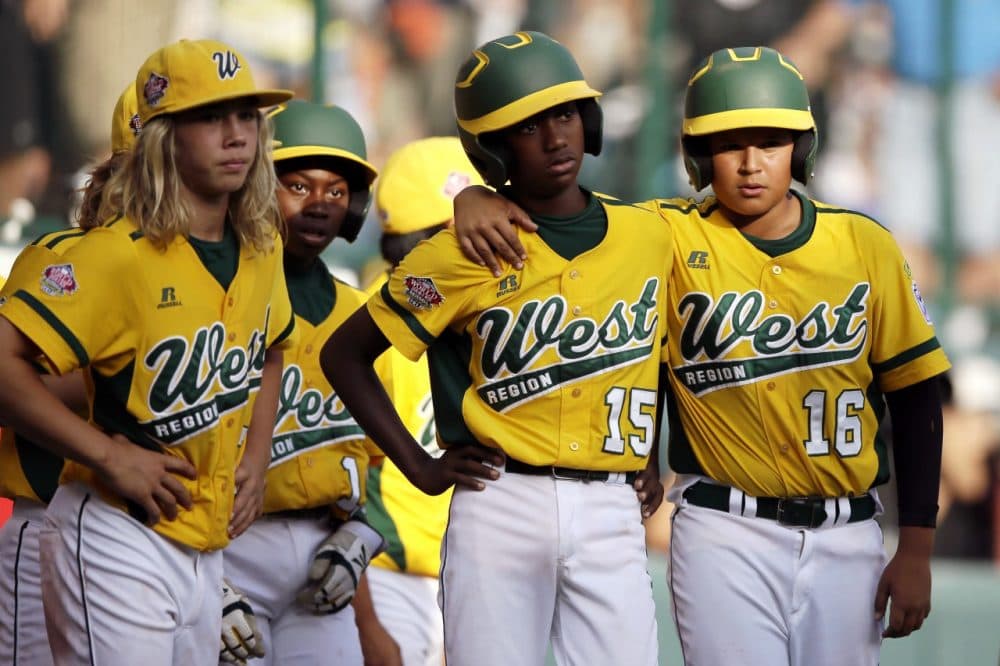Advertisement
Jay Atkinson's 4 Problems With Youth Sports Today
Resume
As summer approaches, many schools across Massachusetts are winding down youth sports leagues for the season. But, for many kids, that doesn't mean they'll stop playing. They'll go to training camps, sign up with private coaches and elite summer leagues.
Many kids beg for these extra programs. But often it's the parents — trying to give their kids that "extra edge" — who are pushing them. After all, it's never too soon to start thinking about that college scholarship, or ticket to the pros — even for a 6-year-old.
It's a long way from the spontaneous, unsupervised ball games that used to crop up on America's streets every evening and weekend throughout the summer. And Jay Atkinson says it's one of the ways that parents are ruining youth sports.
Guests
Jay Atkinson, he runs the Methuen Fun Hockey League "Skate & Read" program. He's most recently author of "Memoirs of a Rugby-Playing Man: Guts, Glory and Blood in the World's Greatest Game." He tweets at @Atkinson_Jay.
Dan Lebowitz, executive director of the Center for Sport in Society at Northeastern University.
Jay Atkinson's 4 Problems With Youth Sports Today
Single Sport Specialization
- "A child is encouraged, some germ of some kind of talent is seen by someone at age 6 or 7 and their parents get convinced to have them play hockey or do hockey dry land training or go to hockey schools year-round, to the detriment of just being a kid — riding their bike and playing whiffle ball and things like that. So that has physical ramifications for the child because if they're doing repetitive motion while they're still growing over and over again, whether it's a skating motion or a throwing motion for a baseball player, they're damaging their joints. Psychologically, it's bad for the child because it's removing the marvel of playing the sport and making it into a routine or a job — that is, psychologically, going to be damaging to the child because eventually they're going to get sick of it."
Privatization
- "The privatization of youth sports and in the piece I use this anecdote about this so-called tier one elite program — I was invited to come and speak at their banquet and those families were paying $4,000 or $5,000 to play ice hockey to try out for the team so that meant 5 and 6-year-olds were trying out for positions and they had 100 kids try out for 18 positions which meant quite a number of kids went home unhappy."
Travel Teams
- "Sometimes they're leaving places like the Merrimack Valley, where hockey's quite good, or metro Boston where hockey's quite good, and they're traveling to Pennsylvania and they're traveling to Maryland... to play hockey in a lesser hockey area just so they will buy the track suits that the team requires you to buy, the bags that the team requires you to buy, underwrite the bus trips, pay the coaches and so forth. So when we were kids, the little league coach, the hockey coach, they were volunteers. They were people who just wanted the kids to get out there and learn something about the sport and make friends."
Parental Involvement:
- "Children, even at a young age, 6 and 7 and 8 years old, they really bond with each other because they were both there when that key hit happened in the little league game. The parent is necessarily outside that experience but the parent is trying to insert him or herself in between the two peers that participate in the experience and that's a mistake. When we were kids, my dad saw me play hockey when I played for the high school team. That's it. He never went and watched me skate on the pond, he was too busy putting a roof over our heads."
More
The Boston Globe: How Parents Are Ruining Youth Sports
- "In brief, that’s exactly what’s wrong with youth sports. Too much money, too much parent involvement, and too many brokenhearted 6-year-olds. (Not to mention too many well-meaning adults who have no clue about all of the above.)"
The Boston Globe: ‘Skate & Read’ Blends Hockey Lessons And Reading Goals
- "After hockey practice on a recent Tuesday, 6-year-old twins Luke and Gavin Henry shed their sticks, gloves, and helmets and headed for a table covered with books. Each took a few minutes to poke through the pile and make a selection. Both chose a title from the “Amulet” series of graphic novels by writer-artist Kazu Kibuishi."
This segment aired on May 12, 2014.